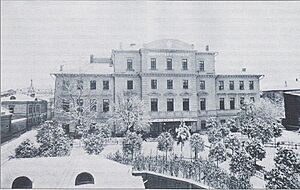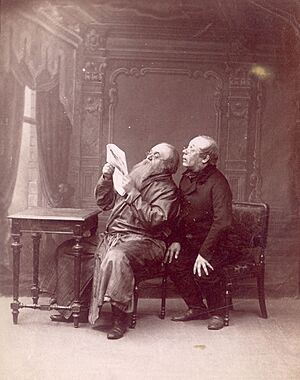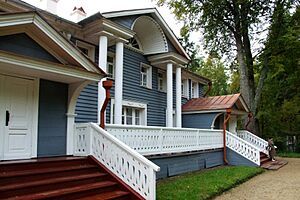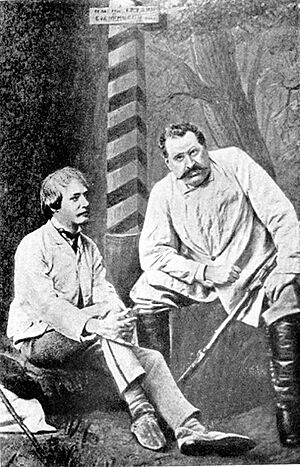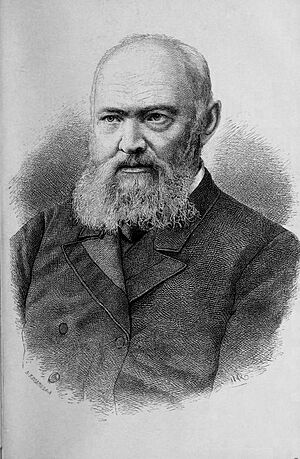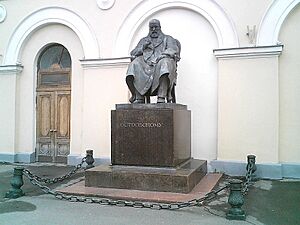Alexander Ostrovsky facts for kids
Quick facts for kids
Alexander Ostrovsky
|
|
|---|---|
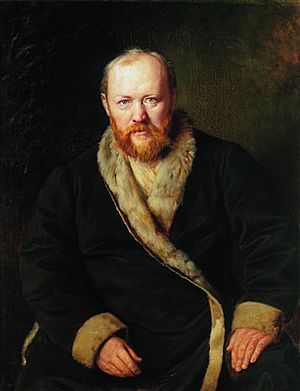
Alexander Ostrovsky by Vasily Perov
|
|
| Born | Alexander Nikolayevich Ostrovsky Александр Николаевич Островский 12 April [O.S. 31 March] 1823 Moscow, Russian Empire |
| Died | 14 June [O.S. 2 June] 1886 (aged 63) Shchelykovo, Kostroma Governorate, Russian Empire |
| Occupation | Playwright • Translator |
| Nationality | Russian |
| Period | 19th century |
| Genre | Comedy • Tragedy |
| Notable works | Enough Stupidity in Every Wise Man The Thunderstorm |
Alexander Nikolayevich Ostrovsky (Russian: Алекса́ндр Никола́евич Остро́вский; April 12, 1823 – June 14, 1886) was a famous Russian playwright. He is known for creating many plays that showed real life in Russia. He wrote 47 original plays, which are still widely read and performed in Russia today. Many people consider him the most important Russian playwright of his time.
Contents
About His Life
Alexander Nikolayevich Ostrovsky was born on April 12, 1823, in Moscow, Russia. His father, Nikolai Fyodorovich Ostrovsky, was a lawyer. In 1839, his father became a high-ranking state official and received a noble title. Alexander's mother, Lyubov Ivanovna Savvina, came from a family of clergymen.
The family lived in Moscow, and Alexander had three siblings: Natalya, Mikhail, and Sergey. His sister Natalya was a close friend during his childhood. He also learned a lot from his nanny, Avdotya Kutuzova. Ostrovsky later said that her fairy tales inspired his popular play, The Snow Maiden.
In 1831, Alexander's mother passed away. A few years later, his father married Baroness Emilia Andreyevna von Tessin. She was a noblewoman who spoke several European languages and played the piano. She made sure her stepchildren received a good education. Emilia Andreyevna also taught Alexander to read music.
In 1840, Ostrovsky finished the First Moscow Gymnasium. He then went to Moscow University to study law. He enjoyed going to the Moscow Petrovsky Theatre and became very interested in plays. In 1843, he left the university and started working as a clerk at the Moscow Court. Later, he moved to the Commercial Court. In 1851, Ostrovsky decided to focus completely on writing and theatre.
Starting His Writing Career
In the mid-1840s, Ostrovsky began writing stories and scenes about the lives of Moscow merchants. He started a play called The Bankrupt. An early part of this play was published in a Moscow newspaper in 1847. He also published "The Picture of a Family Happiness," which he considered his first real work.
In 1847, Ostrovsky read from his works in public for the first time. Important writers and critics were there and praised his talent. However, his play The Picture of Family Happiness was banned from being performed in 1851.
In 1849, he finished The Bankrupt. His friends and other writers loved it. The play was later published as It's a Family Affair-We'll Settle It Ourselves (Свои люди – сочтёмся!). This play made Ostrovsky famous in Moscow because it showed the lives of Moscow merchants very realistically. However, it was quickly banned from theatres and the author was even watched by the secret police.
Ostrovsky's second play was a short one called The Young Man's Morning (1850). His second full-length play, The Poor Bride, came out in 1852. Censors made many changes to it, which made Ostrovsky lose interest in its production.
His play Stay in Your Own Sled (1852) was the first of his plays to be performed at the Maly Theatre. It was very successful and helped create what became known as the "Ostrovsky Theatre." In 1853, Tsar Nicholas I saw the play and loved it, saying it was "not a play, but a lesson."
In 1853, The Poor Bride was successfully performed. Ostrovsky then wrote Poverty is No Vice, which became popular in Moscow. However, some critics and actors did not like his plays, saying the language was too rough. Despite this, the Maly Theatre became like a second home to Ostrovsky.
Later Works and Challenges
Around 1854, Russia was involved in the Crimean War. Ostrovsky became more focused on exploring Russian culture and traditions. His play Don't Live as You Like (1854) showed an old Russian folk festival. This play was not as popular and was soon removed from theatres.
In 1856, Ostrovsky traveled along the Volga River. He collected information about local life and learned a lot about people outside of Moscow. This trip gave him many ideas for future plays, especially The Storm. After this trip, he became more interested in understanding all Russian people.
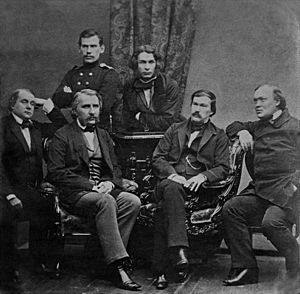
In 1857, his play A Profitable Position came out. It was highly praised by Leo Tolstoy. This play explored how corruption worked in society. Ostrovsky believed that art should show life as it is, not just teach lessons. The premiere of A Profitable Position was canceled because censors thought it made fun of state officials. However, the police stopped watching Ostrovsky.
In 1859, the first collection of Ostrovsky's works was published. Critic Nikolai Dobrolyubov wrote famous essays praising Ostrovsky as a "ray of light in the realm of darkness." Ostrovsky was happy with this analysis of his work. He believed his job was to show Russian people as they truly were, both good and bad.
In 1860, The Storm was released. It's a tragic story about a woman named Katerina. This play was very popular and received great public praise.
Ostrovsky was often frustrated by the theatre world, especially the censorship. His historical drama Kozma Zakharyich Minin-Sukhoruk (1861) was banned without explanation. In 1862, he traveled to Europe, which made him see the differences between Russia and other countries. He continued to write many plays, often based on real-life stories.
By the mid-1860s, Ostrovsky was recognized as Russia's leading playwright. However, many of his plays were still banned. Tsar Alexander II enjoyed ballet and French comedies more than Ostrovsky's dramas, which he found too serious.
In 1867, Ostrovsky and his brother Mikhail bought the Schelykovo estate. He loved this place and found inspiration for new plays there. He called it "the Kostroma Switzerland" because of its beauty.
Later Career and Final Years
In 1868, Ostrovsky published Enough Stupidity in Every Wise Man. This play was a satire set in old Moscow. He also wrote The Ardent Heart (1869), which was a mix of detective story and fairy tale, making fun of Moscow traders. This play was very successful.
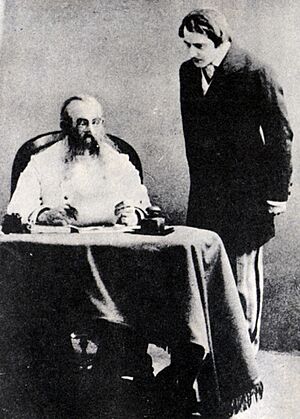
In 1869, Mad Money came out, showing the new class of business people in Russia. Ostrovsky often struggled with money, even though his plays were popular. He sent his new plays to the Maly Theatre and a magazine at the same time. The Forest (1871) was a story about actors that made fun of how old-fashioned some Russian provinces were.
In 1872, Ostrovsky celebrated 25 years of his literary career. The celebration in Moscow was grand, showing how much he was respected there. In 1873, he wrote The Snow Maiden, a unique play based on a myth. While some critics didn't like it, composers Pyotr Tchaikovsky and Rimsky-Korsakov were inspired by it and wrote music and an opera based on it.
Many of Ostrovsky's later plays were based on real events. Wolves and Sheep (1875) was inspired by a real court case about fraud. Without a Dowry (1878) was based on a murder case he knew about. This play is now seen as an important work, even though it wasn't very popular at first.
In 1874, Ostrovsky helped create The Society of Russian Dramatic Art and Opera Composers. This group helped writers with legal issues and financial support. He also wanted to reform Russian theatre. In 1881, he suggested many changes to make theatre better. Some of his ideas led to the opening of private theatres across Russia.
In December 1885, Ostrovsky became the director of the Imperial Theatres' repertoire. He worked hard to improve productions and help new authors. He believed that theatre should be a place for thinking people.
In the autumn of 1883, Ostrovsky visited the Caucasus region and received a warm welcome. He returned with new energy and finished Guilty Without Fault. However, he soon faced financial difficulties again. In 1884, he was finally granted a personal pension from the Court, which helped him.
On May 28, 1886, Ostrovsky traveled to Schelykovo, feeling very ill. He suffered from severe asthma attacks and was in great pain. On June 14, 1886, Alexander Ostrovsky passed away at his home from angina pectoris while translating William Shakespeare's Antony and Cleopatra.
He was buried in the local cemetery in Nikolo-Berezhki. His life was full of hard work and challenges, but he remained dedicated to his ideals and to the theatre.
His Family Life
In the late 1840s, Ostrovsky met Agafya Ivanovna. She was a woman from a modest background who had a deep understanding of everyday life. She lived with him until her death in 1867.
In the early 1860s, Ostrovsky met Maria Vasilyevna Vasilyeva, an actress from the Maly Theater. They became close, and she gave birth to their son, Alexander, in 1864. Their son Mikhail was born in 1866, and a daughter, Maria, in 1867. Alexander Ostrovsky and Maria Vasilyevna Vasilyeva married on February 12, 1869.
Musical Adaptations
Many of Ostrovsky's plays have been turned into operas.
- His play The Storm inspired Leoš Janáček's opera Káťa Kabanová.
- The most famous Russian opera based on his work is Nikolai Rimsky-Korsakov's The Snow Maiden (Snegurochka). Pyotr Tchaikovsky also wrote music for this play.
- His 1854 comedy Don't Live as You Like became the opera The Power of the Fiend by Alexander Serov.
- The historical drama The Voyevoda (Dream on the Volga) was made into two operas: one by Pyotr Tchaikovsky and another by Anton Arensky. Tchaikovsky also wrote music for a scene in the play.
His Impact
Alexander Ostrovsky is seen as one of the most important Russian playwrights of the 19th century. He helped bring realism to the Russian theatre stage. His best plays showed Russian society of his time, especially the lives and customs of the new merchant class. These plays were very popular when he was alive and are still a key part of Russian theatre. They are admired for their strong characters and realistic language.
Ostrovsky wrote 47 original plays with many different characters. His works were very diverse, including dramas, historical stories, and comedies. Some critics loved his originality, while others found his plays too sentimental. However, theatre people and politically neutral critics greatly admired his work.
Many scholars believe Ostrovsky followed in the footsteps of Nikolai Gogol, another great Russian writer. Ostrovsky was known for his vivid characters, strong emotions, and humor. He was also a master of language. In 1859, Nikolai Dobrolyubov noted that many phrases Ostrovsky created became common sayings. Ivan Turgenev wrote that no one before Ostrovsky had such "glorious, tasteful and clear Russian language."
Ostrovsky's plays are not as well known outside of Russia as those of Tolstoy, Dostoevsky, or Turgenev. This is partly because his dialogue is very specific to Russian culture and hard to translate. However, his contributions are central to the development of modern Russian drama.
Two institutes were founded and named after Ostrovsky:
- The Ostrovsky Institute in Tashkent, Uzbekistan, founded in 1945. It is now the Uzbekistan State Institute of Arts and Culture.
- The Ostrovsky Leningrad Theatre Institute in Leningrad, which later became the St Petersburg Institute of Theatre, Music and Cinematography.
See also
 In Spanish: Aleksandr Ostrovski para niños
In Spanish: Aleksandr Ostrovski para niños
 | Chris Smalls |
 | Fred Hampton |
 | Ralph Abernathy |


